Dropping the cancer bomb
But yeah, there’s been a lot of cancer-talk. I’ve got the story so far down to a 2.30-minute elevator speech and a two-paragraph email, with some glib banalities re: optimism thrown in so whomever I’m talking to doesn’t get that horrified look of “oh my god, she’s going to burst into tears right now, and then I’ll have to hug her or something.” You know, because it’s all about making y’all comfortable. And nothing makes people more uncomfortable than having an afflicted person in their midst.
The best reaction? “Damn, that sucks. That totally sucks. How are you holding up?”
The worst reaction? “Yeah, my brother-in-law had that same type of cancer. He died. But I’m sure that won’t happen to you.” *
Most folks land somewhere in the middle, a mix of suprise, horror, and awkward toe-stubbing. Honestly, that's okay, too. What I resent is this notion that it's MY responsibility to put THEM at ease. I think that may be some weird repressed-girl-behavior -- this idea that you're never supposed to upset anyone or rock the boat.
Countless Chicken Soup for the Soul-esque books and articles have been written on how to talk to people with cancer without offending or upsetting them. Newsflash: we’re already offended and upset. Goddammit, cancer picked US. And we weren’t doing a damn thing to cancer. (Then again, a turkey bit my daughter’s finger this weekend at the petting farm when she was just trying to feed it some corn. Greedy bastard turkey, I hope you fry this Thanksgiving.) (There’s almost nothing funnier than a 2.5-year-old saying, "Turkey bit my finger!" over and over.)
Anyway, to all the folks we may have discomforted or disquieted in the last 10 days or so, sorry about that. We sent many of you here because it’s easier to write than speak about your heartache sometimes.
* real quote




